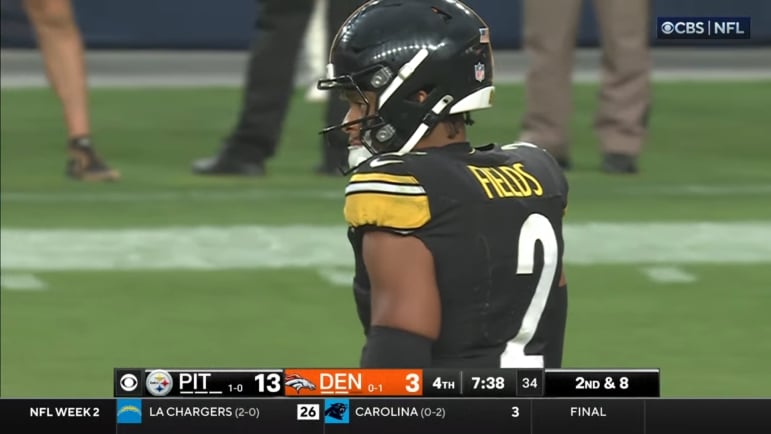Former NFL general manager and Pittsburgh Steelers executive Doug Whaley wonders what the future holds for QB Justin Fields. And how it might impact his present. Appearing on 93.7 The Fan Wednesday morning, Whaley put himself in GM Omar Khan’s shoes and how he would handle Fields going forward.
“My immediate thought is if I’m Omar, I go into [Art Rooney II’s office],” Whaley told the station. “‘What are you willing to pay this guy? Because if he continues on this trajectory, you’re talking 40 to 50 million. Are we ready to do that?'”
Fields has gone from backup to the starting quarterback on one of only five undefeated teams in the league, the Steelers’ first 3-0 start since 2020 and only the fourth time under Mike Tomlin. He’s played within the scheme yet still delivered the highlight-reel plays he flashed in Chicago, a big arm and mobility that make him a headache for defenses to account for.
After trading for Justin Fields in March, the team declined his fifth-year option in May. A predictable and, at the time, agreeable decision but one the team might have to literally pay for in the offseason.
In a world where quarterbacks are routinely reaching $50 million per year and even cresting $60 million as Dallas’ Dak Prescott has achieved, Fields won’t come cheap if he proves to be the Steelers’ slam-dunk starter of the future. If Pittsburgh isn’t ready to assume that cost, Whaley thinks the team could do something drastic.
“Do you throw Russell Wilson in there and maybe lose a couple games for the future?” he said. “Meaning, then you take Fields off the playing field…You don’t have pay him, but you already got your answer.”
Essentially, benching Fields to prevent him from putting up bigger numbers and victories to make him cheaper to re-sign after the season all while believing there’s enough data to make him the starter next season and beyond. It’s pretzel-twisting logic at the expense of the team’s yearly goal, win, especially for a franchise that hasn’t won a playoff game since 2016. Using the entire season to evaluate Justin Fields before deciding to ink him to a mega-deal is clearly the smarter play. And benching your best option at quarterback to save a couple million on a long-term deal isn’t something a franchise like the Steelers would do. Still, Whaley thinks it’s a calculation the front office will have to make.
“Do you sacrifice this year for the eye on the future? So you keep the cost down and you know you got a guy. These are the things that you have to think about when you’re the general manager,” he said. “Now Mike Tomlin’s like, ‘Win, win, win, win every game.’ But Art and Omar have to think financially. What puts the Steelers in a best position to compete for championships? Not this year but in subsequent years.”
Whaley is speaking from experience. After spending a decade in Pittsburgh’s front office, he became the Buffalo Bills’ GM in 2013 before being fired in 2017. A cost-cutting situation played out in 2016 when Bills QB Tyrod Taylor was benched before the regular-season finale. Whaley and Buffalo’s front office ordered head coach Anthony Lynn, interim for the finale after Rex Ryan was fired, to sit Taylor to avoid an injury guarantee triggering in his contract, saving the team money.
There’s a long-term view the Steelers always hold. But they’re an organization committing to winning now. Playing out Whaley’s hypothetical, benching Fields when the team believes he’s the best guy to save money is something the Pittsburgh Pirates, not the Pittsburgh Steelers, would do. While it’s not the case Whaley is explicitly advocating for, even suggesting the idea is foolish and runs counter to how the team has operated for the last 60 years. A non-starter of a conversation and there’s certainly no indications the team is even thinking about it.








